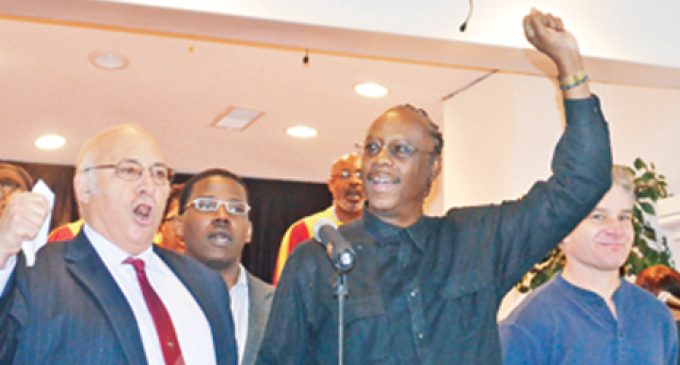Union leaders recalled as trailblazers

A permanent tribute to workers whose strike led to the formation of a landmark union now stands at the corner of Martin Luther King Jr. Drive and Fourth Street.
King Jr. Drive and Fourth Street.
A celebration and unveiling ceremony for the N.C. Department of Cultural Resources’ historic marker was held Saturday near the site at First Calvary Baptist Church. A crowd of more than 140 listened as a number of speakers praised the actions of Local 22 of the Food, Tobacco, Agricultural, and Allied Workers-Congress of Industrial Organizations (FTA-CIO) and those who started it in the 1940s.
The African American workers – most of them female – who initiated a sit-in strike to protest poor wages, working conditions and segregated work spaces were ahead of their time. It was 1943, the height of Jim Crow.
At its height Local 22, which included white workers as well, consisted of 10,000 R.J. Reynolds Tobacco Company workers. It is credited with helping to elect Kenneth R. Williams in 1947, the city’s first black alderman, and is considered a precursor to the national Civil Rights Movement.
“It was a very important moment in the history of the struggle for social and economic justice in the United States and around the world,” said Robert Korstad, a Duke University professor who wrote a book, “Civil Rights Unionism,” that details the story of Local 22.
Larry Little, a local activist and Winston-Salem State University professor, recalled his mother, Ochie Bell Little, who was part of the movement that started Local 22 and was fired as a result. He also remembered Velma Hopkins, another union organizer, as a strong and audacious woman.
“This idea of black women sitting around the table negotiating with powerful industrialists … and (Hopkins) would smoke that cigarette and blow that smoke in white folks’ face,” Little said.
N.C. Senator Earline Parmon, who was mentored by Hopkins, added that the cigarettes she smoked using a holder were those of an R.J. Reynolds competitor. She said Hopkins, who she called “momma,” was instrumental in shaping her and a generation of local black leaders.
“I stand here today because of the courageous women who refused to bow to the pressures of the maternalistic power brokers of the day,” Parmon said.
Hopkins and the others faced major backlash for their actions, including being labeled as communists. Richard Koritz’s father, Phil, was head organizer for Local 22 and spent time in prison after he and several others were arrested during a 1946 protest at Piedmont Leaf Tobacco Plant. He said Local 22 leader Robert “Chick” Black was forced to leave the city and work in Greensboro, but never had regrets about his involvement in the union.
“He had lived not only to see Reynolds treat the mass of their workers with respect, but he had played a major role in making it happen,” said Koritz, who is a union leader for the National Association of Letter Carriers (AFL-CIO).
Local 22 ended in 1950, after a National Labor Relations Board ruling stripped the union of its rights to represent workers. Korstad said those affiliated with unions dealt with a negative stigma long after 1950. When he started trying to interview former Local 22 members in the 1970s to document the union’s history, no one wanted to talk to him; he said some literally slammed the door in his face. Korstad said with Black’s help, he eventually got them to open up to him.
Linda Sutton told attendees of her own work with a communications workers union. Sutton, an organizer with Democracy North Carolina and the outgoing chair of the Forsyth County Board of Elections, said that many of the benefits that today’s workers enjoy, including the 40-hour work week, are a result of decisive stands unions took decades ago.
“I owe my life to the union,” said Sutton.
Justin Flores, an organizer with the Farm Labor Organizing Committee (AFL-CIO), said these days tobacco farm workers are seeking better wages and conditions from Reynolds American Inc., the parent company of R.J. Reynolds.
Flores said many doubted if FLOC leaders could organize in the South – which has been staunchly anti-union for the past 60-plus years – or get Reynolds officials to agree to a meeting. Over the last five years, both have been accomplished. Reynolds executives met with FLOC President Baldemar Velasquez last year to discuss workers’ concerns.
“It doesn’t matter what they say, it matters what we do,” Flores said.












